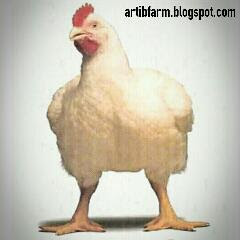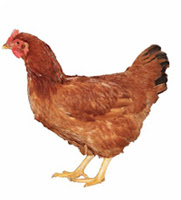How To Generally Prevent Poultry Diseases
One of the major challenges in poultry business is disease/infection of the birds. It negatively affect the growth, development and even farmer's profit. Poultry are kept for various reasons like being a source of meat, income and job opportunity. It can be kept by anyone, even in your backyards.
Poultry disease is not only caused by pathogens. There are other important factors that should be properly attended to. The factors are MANAGEMENT, ENVIRONMENT and CHICKEN BREED. Healthy birds eat less feed and produce more meat and eggs. They are not only cost effective but also less trouble to cater for.
Poultry disease is not only caused by pathogens. There are other important factors that should be properly attended to. The factors are MANAGEMENT, ENVIRONMENT and CHICKEN BREED. Healthy birds eat less feed and produce more meat and eggs. They are not only cost effective but also less trouble to cater for.
Spread Of Diseases
Poultry diseases spread quickly as the birds are kept together in a chicken house or cage. They share things like feeders and water bowls together which can spread infection from sick birds to healthy ones. As earlier said, factors that can contribute to poultry diseases are Management, Environment and Chicken breed. Let's now discuss the factors one after the other.
Poultry diseases spread quickly as the birds are kept together in a chicken house or cage. They share things like feeders and water bowls together which can spread infection from sick birds to healthy ones. As earlier said, factors that can contribute to poultry diseases are Management, Environment and Chicken breed. Let's now discuss the factors one after the other.
A) Management: This factor includes poor hygiene, overcrowding of the chicks, rat and flies invasion, leaking water bowls, chicken of mixed age kept together, poor quality feed/water and inability to prevent people and animal from entering your chicken house.
B) Environment: What can contribute to this are too hot or too cold conditions, wet litter, high build up of chicken droppings, poor air circulation, sharp wires in the cages and dusty bedding.
C) Chicken Breed: Young chickens, weak second-grade chickens, Chickens affected with other diseases, Poor condition as a result of underfeeding and poor vaccination programme.
There are certain steps you have to take at the first signs of diseases in your birds. The chickens must be treated, and management that may have led to the problem must be corrected to prevent the disease from occurring again. Consult your animal health technician or veterinarian to help you find a correct solution to your problem as soon as possible.
General Preventive Measures
As for the spread of disease that has to do with MANAGEMENT, you need to apply correct methods for raising young chicks (temperature, food, water, bedding), disinfect and clean the housing of the different groups of chicks, maintain the correct stocking density (avoid over-crowding), use the best-quality food that is available and provide clean water daily, use bedding that is not dusty, prevent the buildup of gases by cleaning and ventilation, control rats and flies, prevent people from outside your farm visit the chicken house and finally have bird-proof houses to keep out wild birds that eat the feed.
For the infections caused by ENVIRONMENT, ensure that your chicken house is large enough, fix leaky watertroughs, feed and waterbowls should be cleaned daily and fresh food and water should be supplied, houses should be warm in winter and cool in summer and well ventilate, dust causes irritation of the respiratory tract and the environment must therefore not be dusty, Use cages for laying hens that do not have sharp edges that can injure the hens and then ensure there is sufficient space per hen.
Diseases caused by CHICKEN BREED can be prevented by getting only first-grade chicks from a reliable supplier, vaccinate chicks against important diseases and also keep chickens of the same age together in one house.
As for the spread of disease that has to do with MANAGEMENT, you need to apply correct methods for raising young chicks (temperature, food, water, bedding), disinfect and clean the housing of the different groups of chicks, maintain the correct stocking density (avoid over-crowding), use the best-quality food that is available and provide clean water daily, use bedding that is not dusty, prevent the buildup of gases by cleaning and ventilation, control rats and flies, prevent people from outside your farm visit the chicken house and finally have bird-proof houses to keep out wild birds that eat the feed.
For the infections caused by ENVIRONMENT, ensure that your chicken house is large enough, fix leaky watertroughs, feed and waterbowls should be cleaned daily and fresh food and water should be supplied, houses should be warm in winter and cool in summer and well ventilate, dust causes irritation of the respiratory tract and the environment must therefore not be dusty, Use cages for laying hens that do not have sharp edges that can injure the hens and then ensure there is sufficient space per hen.
Diseases caused by CHICKEN BREED can be prevented by getting only first-grade chicks from a reliable supplier, vaccinate chicks against important diseases and also keep chickens of the same age together in one house.
General Treatment
#1) There are not many forms of treatment or in certain cases no treatment for some diseases, which makes prevention so important.
#2) The treatment will depend on the cause of the disease.
#3) If it is at all possible, try to separate all sick chickens from the healthy ones daily. The sick chickens should be handled and treated last to prevent the spread of the disease.
#4) Correct management problems.
#1) There are not many forms of treatment or in certain cases no treatment for some diseases, which makes prevention so important.
#2) The treatment will depend on the cause of the disease.
#3) If it is at all possible, try to separate all sick chickens from the healthy ones daily. The sick chickens should be handled and treated last to prevent the spread of the disease.
#4) Correct management problems.
For quick updates and comments, follow us on our social media connects; FacebookPage, TwitterHandle and Instagram. You can also subscribe and watch videos on our YouTube channel. At Artib Farm, we materialize your satisfaction!
Reference
1.) http://nda.agric.za/publications/poultry_diseases.html





Comments
Post a Comment